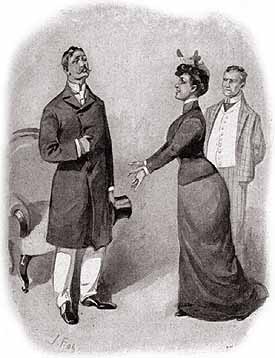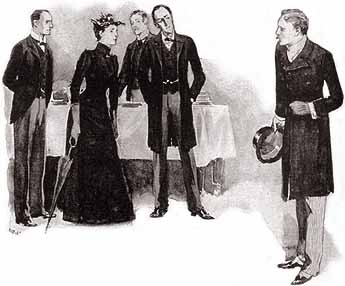“Then we had a talk as to what we should do, and Frank was all for openness, but I was so ashamed of it all that I felt as if I should like to vanish away and never see any of them again –just sending a line to pa, perhaps, to show him that I was alive. It was awful to me to think of all those lords and ladies sitting round that breakfast-table and waiting for me to come back. So Frank took my wedding-clothes and things and made a bundle of them, so that I should not be traced, and dropped them away somewhere where no one could find them. It is likely that we should have gone on to Paris to-morrow, only that this good gentleman, Mr. Holmes, came round to us this evening, though how he found us is more than I can think, and he showed us very clearly and kindly that I was wrong and that Frank was right, and that we should be putting ourselves in the wrong if we were so secret. Then he offered to give us a chance of talking to Lord St. Simon alone, and so we came right away round to his rooms at once. Now, Robert, you have heard it all, and I am very sorry if I have given you pain, and I hope that you do not think very meanly of me.” | 「その後私達はこれからどうするべきか話し合いました / フランクは完全に率直でしたが / しかし私は全てを非常に恥ずかしく感じ / 私はこんな風に感じていました / 消え去った方がいい / 誰にも二度と会わず / 父には手紙で知らせるだけで / おそらく / 私が生きていることを◆考えただけでも恐ろしいことでした / 貴族や貴婦人がみんな朝食のテーブルを取り囲んで / 私の帰りを待っている事を◆なのでフランクは私の結婚衣裳やその他を包みにして / 後を追われないように / そしてどこか見つけられない所に捨てました◆おそらく私達は明日パリに発つことになっていたでしょう / この親切な紳士、シャーロックホームズさんが / 今晩私達の前に現れなかったら / どうやって私達を見つけたかは想像もつきませんが / そしてこの方がはっきりと丁寧に示してくれなかったら / 悪いのが私でフランクは悪くないと / そして私達の立場が悪くなると / そう秘密にしていては◆それから彼はセント・サイモン卿お一人と話す機会を授けて下さり / そして私達は彼の住まいから直ちにやってきました◆今 / ロバート / 全て聞いた通りです / あなたに苦痛を与えた事は本当に申し訳なく思っています / 私のことを浅ましい女と思わないで下さい」 |
Lord St. Simon had by no means relaxed his rigid attitude, but had listened with a frowning brow and a compressed lip to this long narrative. | セント・サイモン卿は全く頑なな態度を崩さなかった / だが聞いていた / 眉をひそめ / 唇を噛み締めて / この長い話を |
“Excuse me,” he said, “but it is not my custom to discuss my most intimate personal affairs in this public manner.” | 「すまないが」 / 彼は言った / 「しかしこれは私の流儀ではない / 非常に内密な私事を話し合うのは / こんな公然としたやり方で」 |
 | |
“Then you won’t forgive me? You won’t shake hands before I go?” | 「それでは私を決して許してはくれないのですか? / 別れる前に握手もしてもらえないのですか?」 |
“Oh, certainly, if it would give you any pleasure.” He put out his hand and coldly grasped that which she extended to him. | 「いえ、結構ですよ / それで満足いただけるなら」 / 彼は手を差し出して / 彼女が差し出した手をよそよそしく握った |
“I had hoped,” suggested Holmes, “that you would have joined us in a friendly supper.” | 「思っていたのですが」 / ホームズは提案した / 「友好の食事にご同席いただければと」 |
“I think that there you ask a little too much,” responded his Lordship. “I may be forced to acquiesce in these recent developments, but I can hardly be expected to make merry over them. I think that with your permission I will now wish you all a very good-night.” He included us all in a sweeping bow and stalked out of the room. | 「それはちょっとばかり望み過ぎかと思います」 / 閣下は返答した◆「この新しい展開にはしぶしぶ同意させられても / しかし彼らと楽しくやれるとはとても思えません◆それでは、あなた方がよろしければ / 失礼させていただく」 / 彼は私達をひっくるめて一つの大きな礼で挨拶し / 部屋からもったいぶって出て行った |
 | |
“Then I trust that you at least will honour me with your company,” said Sherlock Holmes. “It is always a joy to meet an American, Mr. Moulton, for I am one of those who believe that the folly of a monarch and the blundering of a minister in far-gone years will not prevent our children from being some day citizens of the same world-wide country under a flag which shall be a quartering of the Union Jack with the Stars and Stripes.” | 「ではせめてあなた方は / ご相伴していただけるでしょうね」 / シャーロックホームズは言った◆「アメリカ人と会うのはいつも楽しみで / モールトンさん / なぜなら私は信じる者の一人だからです / 愚かな君主と / はるか昔の大臣のドジが / 私達の子孫を妨げることはないと / いつの日か一つの世界的な国の市民となる事を / 一つの旗の元に / ユニオン・ジャックと星条旗を組み合わせたものになるであろう」 |
“The case has been an interesting one,” remarked Holmes when our visitors had left us, “because it serves to show very clearly how simple the explanation may be of an affair which at first sight seems to be almost inexplicable. Nothing could be more natural than the sequence of events as narrated by this lady, and nothing stranger than the result when viewed, for instance, by Mr. Lestrade, of Scotland Yard.” | 「この事件は面白かった」 / ホームズは言った / 訪問者が去った時 / 「なぜならこれがはっきりと示す働きをしているからだ / 一つの事件の説明が如何に単純でありうるかを / 一見、ほとんど説明できないように思えるものが◆これ以上自然ではありえない / この女性が語る出来事の連続は / そしてこれ以上不思議な事は無い / この結果を例えばロンドン警視庁のレストレード警部から見た時ほど」 |
“You were not yourself at fault at all, then?” | 「君は全然当惑しなかったんだね / それじゃ?」 |
“From the first, two facts were very obvious to me, the one that the lady had been quite willing to undergo the wedding ceremony, the other that she had repented of it within a few minutes of returning home. Obviously something had occurred during the morning, then, to cause her to change her mind. What could that something be? She could not have spoken to anyone when she was out, for she had been in the company of the bridegroom. Had she seen someone, then? If she had, it must be someone from America because she had spent so short a time in this country that she could hardly have allowed anyone to acquire so deep an influence over her that the mere sight of him would induce her to change her plans so completely. You see we have already arrived, by a process of exclusion, at the idea that she might have seen an American. Then who could this American be, and why should he possess so much influence over her? It might be a lover; it might be a husband. Her young womanhood had, I knew, been spent in rough scenes and under strange conditions. So far I had got before I ever heard Lord St. Simon’s narrative. When he told us of a man in a pew, of the change in the bride’s manner, of so transparent a device for obtaining a note as the dropping of a bouquet, of her resort to her confidential maid, and of her very significant allusion to claim-jumping claim-jumping–which in miners’ parlance means taking possession of that which another person has a prior claim to –the whole situation became absolutely clear. She had gone off with a man, and the man was either a lover or was a previous husband –the chances being in favour of the latter.” | 「最初から / 僕には二つの事実が明白だった / 一つは女性は結婚式に極めて乗り気だったという事実 / もう一つは数分後に家に戻った時には後悔していたという事実◆明らかに何かがその朝起きた / そして / 彼女の気持ちを変える結果となった◆それが何なのか? / 彼女が外出しているあいだには誰とも話はできなかった / 新郎とずっと一緒だったからだ◆では誰かを見かけたか? / もしそうなら / それはアメリカからきた人物でなければならない / なぜなら彼女はこの国に来て間が無い / 誰かに与える事はまずできなかった / 彼女にそんなに大きな影響を及ぼす力を与える事は / ただ一目見ただけで / 彼女の計画をここまで完全に変えるように促す◆我々はすでに到達したと分かるだろう / 排除の過程によって / 彼女はアメリカ人を見かけたという考えに◆それではこのアメリカ人はだれか / そしてなぜ彼女に対してそれほどの影響力を持っているのは / 恋人かもしれない / 夫かもしれない◆彼女は若い時を / 荒っぽい場所の奇妙な状況下で過ごした◆ここまではセント・サイモン卿の話を聞くまでに分かっていたことだ◆彼が我々に語った時 / 信者席の一人の男ことを / 新婦の態度の変化を / メモを受け取るための非常に見え透いた策略 / ブーケを落とすという / 腹心のメイドに助けを求めた事 / そして彼女の重大な言及 / これは鉱山仲間の言葉で、意味は / 他の人間が優先権を持っていたものを手に入れる / 全ての状況は完全に明確になった◆彼女はこの男と駆け落ちした / 恋人か前の夫かと / 見込みはおそらく後者だろう」 |
“And how in the world did you find them?” | 「しかしいったいどのようにして二人を見つけたのだ?」 |
“It might have been difficult, but friend Lestrade held information in his hands the value of which he did not himself know. The initials were, of course, of the highest importance, but more valuable still was it to know that within a week he had settled his bill at one of the most select London hotels.” | 「それは面倒だった可能性があった / しかしレストレードが情報を入手した / 自分自身ではその価値を知らなかったが◆イニシャルは / もちろん / とびきり重要だった / しかしそれよりさらに重要だったのは / 分かった事だ / 一週間以内に彼は勘定を支払ったということだ / ロンドンの非常に高級なホテルの一つで」 |
“How did you deduce the select?” | 「どうして高級だと推理したのだ?」 |
“By the select prices. Eight shillings for a bed and eightpence for a glass of sherry pointed to one of the most expensive hotels. There are not many in London which charge at that rate. In the second one which I visited in Northumberland Avenue, I learned by an inspection of the book that Francis H. Moulton, an American gentleman, had left only the day before, and on looking over the entries against him, I came upon the very items which I had seen in the duplicate bill. His letters were to be forwarded to 226 Gordon Square; so thither I travelled, and being fortunate enough to find the loving couple at home, I ventured to give them some paternal advice and to point out to them that it would be better in every way that they should make their position a little clearer both to the general public and to Lord St. Simon in particular. I invited them to meet him here, and, as you see, I made him keep the appointment.” | 「値段が高級だったからだ◆一晩八シリングで一杯のシェリーが八ペンスというのは / 最も値のはるホテルの一つを意味している◆これだけの相場の料金のホテルはロンドンでもそう多くはない◆ノーサンバーランド通りの二軒目のホテルで / 僕は宿泊名簿を調べて分かった / フランシス・H・モールトン / アメリカの紳士が / 前の日に部屋を後にした / そして彼につけられた記載事項をざっとみて / まったく同じ項目に出会った / 複写の勘定書きで見ていたのと◆彼の手紙はゴールドンスクエアへ転送されることになっていた / だから僕はそこに行き / 幸運にも愛し合う二人が家にいるのを見つけた / 僕はあえて父親のような助言をして / 二人に指摘した / 全ての点でいいだろうと / 彼らの立場をもう少し明確にするほうが / 一般社会に対してもセント・サイモン卿に対しても◆僕は二人を彼にここで会うように招待し / そして / ご覧のとおり / 僕は彼と会う約束をした」 |
“But with no very good result,” I remarked. “His conduct was certainly not very gracious.” | 「しかしあまり上手く行かなかったな」 / 私は言った◆「彼の振る舞いはたしかにあまり感じよくはなかった」 |
“Ah, Watson,” said Holmes, smiling, “perhaps you would not be very gracious either, if, after all the trouble of wooing and wedding, you found yourself deprived in an instant of wife and of fortune. I think that we may judge Lord St. Simon very mercifully and thank our stars that we are never likely to find ourselves in the same position. Draw your chair up and hand me my violin, for the only problem we have still to solve is how to while away these bleak autumnal evenings.” | 「ああ / ワトソン」 / ホームズは言った / 笑いながら / 「誰でも感じよくはできないだろう / もし / この求愛と結婚式のすったもんだの後で / 一瞬にして妻と財産を奪われた事を知れば◆僕は思う / 我々はがこう判定してもいいのと / セント・サイモン卿は非常に情け深いと / そして我々の星回りに感謝しようと / 我々はこういう立場になることは決してないだろうから◆椅子を引き寄せてバイオリンを手渡してもらえないか / まだ解決しなければならない唯一つの問題は / どうやってこの侘しい秋の夜を過ごすかだ」 |